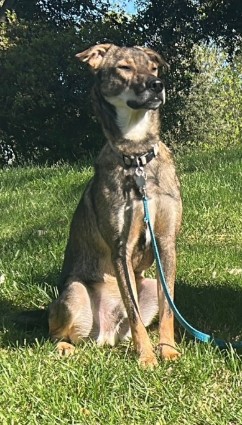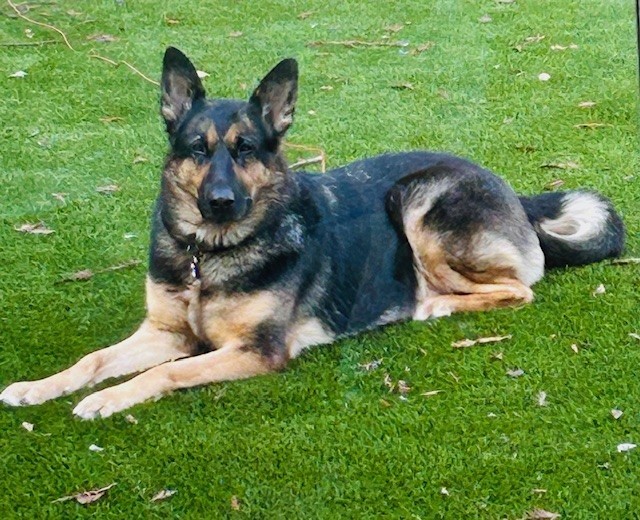Finding the Right Dog for Your Family
It's important to understand where our dogs come from and what sorts of behaviors you are likely to see when you bring a new dog home. It's also important to wait for the right dog to fit into you family and lifestyle. This could take some time, depending on your requirements for your new dog. Finally, once you've found the right dog, you'll need to sign the Adoption Agreement and Release Form, and then you can bring your new dog home!
Where GSGSR Dogs Come From
The typical German Shepherd Dog we pull from a shelter is about one to three years old, has been an outdoor dog, has had minimal or no socialization with other animals, people or environments beyond its backyard and has been neglected in terms of care, exercise, and basic training in manners and obedience. At that age it is at the peak of its energy, strength, and adolescence behaviors. Most commonly it lived with owners who bought it when it was a cute puppy and then was relegated to the backyard when it got big and they got tired of it jumping on them, knocking over the children, nipping, countersurfing, destroying property and having housetraining accidents. They got rid of it when it escaped too often, barked too much, dug too many holes, had too many neighbor complaints, or they wanted to bring another cute puppy home.
Our dedicated fosterers smooth the roughest edges off of these dogs and work with them to get them used to a crate, walk on a leash, and develop basic manners and obedience. However, they will need additional efforts from their adopters to turn into confirmed canine good citizens.
How We Match People with Dogs
Our dog evaluators and fosterers know the personality and temperament of our dogs the best. Our foster families are an integral part in determining if a potential adopter is a good match and has a good lifestyle for one of our program dogs. While our dog evaluators and foster families help us learn about each dog, we have a standard approval process that each potential adopter must complete prior to adopting one of our dogs, that lets us find out about the lifestyle and dog experience of each potential adopter.
Our interview process allows one of our area adoption counselors to discuss with a potential adopter which type of dog would best fit their lifestyle. The home visit allows us to meet all family members and current pets as well as determine if there are any safety issues or escape routes in the environment that the dog will be exposed to. After completing the Adoption Approval Process, approved adopters will be ready to adopt one of our dogs who is compatible with their level of experience and lifestyle.
It is important for potential adopters to realize that one of our highest priorities is considering the lifestyle needs of our dogs. Although this can sometimes make the adoption process frustrating, it may help you if you understand why this is our priority. The dogs in our program usually come from shelters or other life-threatening or difficult circumstances. Most of our dogs have been abandoned and/or neglected. Due to their history, one of our top priorities is to match them with the best adoptive home that will let them live their lives out fully by keeping them safe, healthy, and physically, and mentally fulfilled.
Finding the Right Dog
The adoption counselor will notify the potential adopter about any dogs in our program that we think are a good match for their lifestyle. Potential adopters who have a lifestyle that includes working eight or more hours a day, have children in the home or who visit who are younger than seven years old, or have cats, other small pets or livestock, may find that it take several months or longer for us to find a dog who we think would be a good fit for that lifestyle. If it is not obvious why this would be so, please read Is a German Shepherd Right for You? The adoption coordinator will help coordinate a meeting between potential adopters and dogs that are determined to be a good match with their lifestyle.
If your adoption counselor or the dog fosterer decide that the dog is not a good match for your lifestyle, please respect that they have the most knowledge and understanding of the requirements of that dog's temperaments and keep searching for a dog that our volunteers agree is a good match for you.
Potential adopters are encouraged to meet the dog several times before making a decision to adopt. All members of the household are expected to meet the dog before a final decision on whether to adopt the dog is made. If there are other dogs in the home, they will be required to meet the dog you are interested in before the adoption can be finalized. The fosterers (or equivalent) assessment of the dog/potential adopter interaction, as well as the various interviews and home visit, will be taken into serious consideration in the decision to finalize any adoption. The GSGSR Board of Directors has the final say regarding approval of all adoptions.
There are many things that a potential adopter should find out about the temperament and behaviors a dog has exhibited before deciding if the dog is a good match. See the article Finding an Adoptable GSD (about half way down the page) for some ideas of questions to ask. It is critical that the potential adopter understands the answers to the following questions and is willing and able to provide the dog with its requirements.
- Whether the dog need additional manners and/or obedience training.
- What types of bad habits the dog has exhibited.
- How much daily exercise the dog seems to require in order to settle down.
- How the dog behaves meeting new people, new animals, and new situations.
- Where the dog is left when it is left alone.
- Whether the dog has had any medical issues.
The Adoption Agreement and Release Form
If the fosterers, the adoption counselor and potential adopter all think that a dog is a good match, the adoption is approved. Once the adoption is approved the adopter and a GSGSR representative (usually the foster or your adoption counselor) complete the adoption process by filling out and signing an Adoption Agreement (contract) and Release form and paying the adoption fee.
The minimum adoption fee is stated on the Adoption Agreement and Release form. If a particular dog costs us more than that to rescue and rehabilitate we always appreciate if the adopter can donate an additional amount of the documented costs incurred to rescue their dog. Since we are a 501 (c)(3) all donations are tax deductible. We keep medical receipts, boarding receipts and similar for each program dog.
Remember that when you adopt a dog it becomes yours! Select it with the full understanding that you are responsible to care for it, train it, meet its medical needs, address any behavior problems, and love it for the rest of its life, even if it isn't perfect. Your circumstances may change; you may move, get married, change jobs, add a new baby, add a new pet, or whatever. But your dog will depend on YOU to take care of it. Please select your new dog with care.


